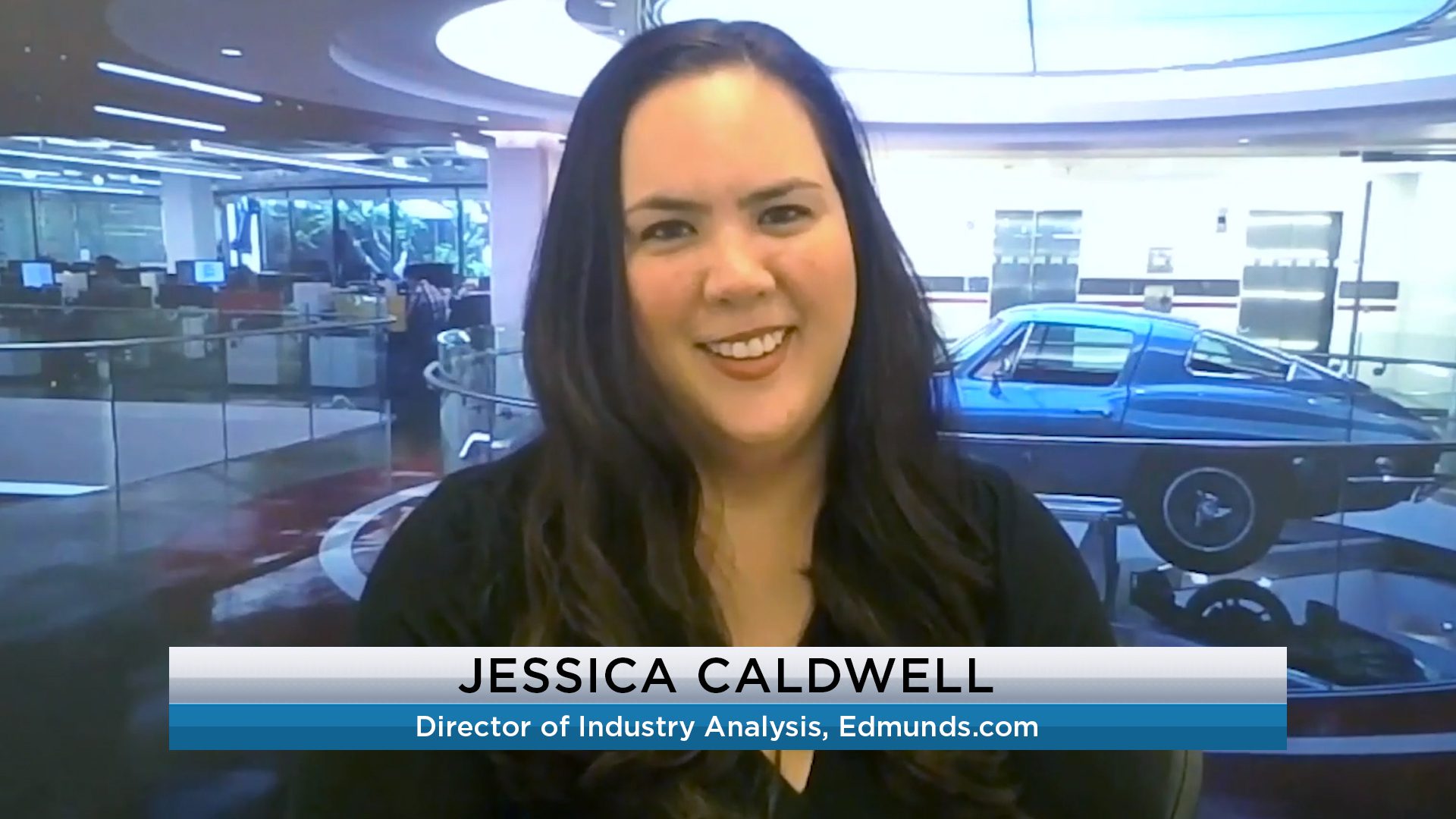Historically low unemployment, new tax cuts, and a sharp decrease in gas prices set the tone for yet another strong year for 2018. According to numerous projections, the industry is likely to see the fourth consecutive year above 17 million vehicles. Here to tell us more about the December numbers is Executive Director of Industry Analysis at Edmunds.com, Jessica Caldwell.
VIDEO TRANSCRIPT:
Jim Fitzpatrick: Glad to have you back, Jessica. Thank you so much for joining us.
Jessica Caldwell: Hello. Good to be back. Thank you for having me.
Jim Fitzpatrick: Cool. Let’s dive right in here. Talk to us a little bit about the winners and losers for December.
Jessica Caldwell: Everyone did fairly well. I mean December was a good month. I’d say that the winner that people have seen out there probably the most is FCA with their trucks and their SUVs. They made that hard to decision to shutter their car brands up quite a while ago and it seems like they’re starting to see some of those benefits by reporting some really high sales, good numbers from Jeep as always, and more good things coming from them this year expected.
It looks like the other domestics didn’t fair as well, a little bit of a tough month from Ford. I think that the big news too is we’re all losers because Ford is no longer going to be reporting their sales numbers every month. They’re only going to come out in quarters, so we’ll have less to talk about each month. I feel like we’re all a bit of losing from that aspect in going forward in 2019.
Jim Fitzpatrick: Why do companies choose to do that do you think?
Jessica Caldwell: Well I think that month to month reporting I mean that’s a short period of time, so I think when they’re looking at their business plans for the whole year it’s tough to give people a snippet of their business for 30, 31 days. I think that as they especially move to shut down car lines the numbers are not gonna look so bad because there’s so much emphasis that’s put on year over year results, if you look at January versus January, those type of things. I think that for GM they’ve definitely struggled there, and Ford I think is going down the same road essentially.
Jim Fitzpatrick: Do you think that Ford’s idea and FCA to get out of the vehicle business, the car business, and to be in trucks and SUVs was a good one?
Jessica Caldwell: Well it seems like it is right now in the short term. I mean I think the thing is that SUVs are so close to what cars are. I mean crossovers are essentially the replacement for sedans, so we’re not talking about all new different concepts here.
I think that, that probably is the body style that Americans and, actually globally to be quite honest, are preferring. It feels like that business is right. I just think when we say trucks and SUVs it means something a little bit different in 2019 then it did maybe 10 years ago.
Jim Fitzpatrick: Can you highlight for us some of the things that stand out in December’s Data Report for New and Used Vehicle Sales?
Jessica Caldwell: Well I mean I think that the number is being as strong as they were. I mean we weren’t necessarily even as soon as last month expecting 2018 to surpass 2017 in sales, but it has. I think that is really surprising, so there’s certainly some strength in the market. We’ve seen rising interest rates be an issue. They were dialed back a little bit in December because of all the year-end deals and incentives. That certainly seems like it should’ve been a bigger roadblock than it has, so I think there was a lot of surprises in the numbers. I mean all positive. The fact that we finished 2018 on a high note, we beat 2017 sales when we thought it would be the other direction, I think it shows a lot of positive momentum in the auto industry.
Jim Fitzpatrick: Yeah. There’s a lot of consumer confidence out there in spite of some of the concerns about tariffs, and the stock market, and things of that nature.
Jessica Caldwell: There is. I think that, that is so important. I mean it really is the backbone of auto sales. When the economy is good auto sales has a good support system. If it’s not, we saw what we saw in 2008, 2009 when things were not so great.
Jim Fitzpatrick: Right, correct.
Jessica Caldwell: I think the fact that things still feel strong in terms of jobs, in terms of consumer confidence that is a good foundation for 2019 in auto sales.
Jim Fitzpatrick: Sure. The unemployment rate continues to stay just at a record low, and that also drives sales. Does it not?
Jessica Caldwell: It definitely does. People need to have jobs to buy cars. Cars are not cheap. They are expensive as all your viewers know.
They’ve seen rising transaction prices, especially for those SUVs and trucks. The rollback in gas prices recently they’ve been relatively low in 2018, but they’ve gone even lower in the past few months.
Jim Fitzpatrick: Yeah.
Jessica Caldwell: That all of that just adds into extra money in consumer’s pockets, and that always it is certainly a help to auto sales.
Jim Fitzpatrick: Boy, that’s for sure. What kind of market activity can retailers expect going into the first quarter of 2019?
Jessica Caldwell: The first quarter in January and February particularly are usually a little bit slow. We have that hangover effect from the end of the year. November and December were very strong this year as they usually are. You see a bit of a slow down in terms of auto sales. That’s seasonal, so it’s to be expected. I imagine those retailers expect that. I think we’re waiting to see how consumers are reacting to interest rates. I mean they are as high as they’ve been in years right now. It doesn’t seem to be slowing sales too much, but I think at some point there could be some concerns. I’d say the other big trend that we’ll probably see in the first quarter and throughout 2019 are just all the lease returns coming back. I mean 2016, which was three years ago on a typical lease there is more leases than we’ve ever seen.
Jessica Caldwell: And so, I imagine that a lot of those folks will be coming back on leases, so I think that some of the retailers will have to deal with their consumers whether or not they get into another leases, whether they buy a new car, a used car, what have you. But I think that, that will be a big trend you’ll see in dealerships.
Jim Fitzpatrick: When you’re speaking of leasing, which luxury brands do a lot of, how did the luxury brands suit up by the end of the year?
Jessica Caldwell: Well luxury is always big in December. That is their time to shine. November and December are historical people waited for those big year-end bonuses. That’s not really the case anymore, but it’s still something that people talk about getting that bonus and then buying their luxury vehicle.
Jim Fitzpatrick: The December to remember, right.
Jessica Caldwell: Of course. But you do see a little bit more sales during that period. As luxury makers they want to get those 2018s out. Usually luxury buyers they want the latest and greatest, so they don’t really want those older cars sitting on dealership lots, so end of year is always a great time for luxury.
Jim Fitzpatrick: Yeah, for sure. You think the luxury brands will continue strong in the first quarter?
Jessica Caldwell: Well luxury brands have seen a renaissance themselves too. I mean we think of those luxury cars, the Icons, and 3 series, the C class, those are changing. They’ve been transitioning into SUVs. I’d say that they’re a bit later to the game than some of the mainstream auto makers in terms of giving some of the bigger SUVs. We do see a bit of a shake up in the luxury segment. I mean they’re handling it smoothly of course, but there’s a lot more products. [inaudible 00:07:03] consumers coming back into a Mercedes dealership, a BMW dealership, they may be seeing something a lot different then they saw five, 10 years ago.
Jim Fitzpatrick: Let’s talk a little bit about Tesla, and Tesla’s fourth quarter vehicle production and delivery announcement that was made recently. What does this mean for the company?
Jessica Caldwell: Well Tesla is having real auto company issues. I mean they’re at the point where they’re not necessarily getting that full federal rebate.
Jim Fitzpatrick: Right.
Jessica Caldwell: They’ve always had higher than maybe advertised prices on their cars because they factor in things like the rebate, money spent on gas, I think time it takes you to go to a gas station. They factor all those things in some of their average prices. I think they may be hitting the market that’s a little bit more resistant because now all of a sudden consumer are gonna have to pay more. They’re still gonna get the $3500 federal rebate, but it’s still a big chunk of change they’re losing out on. I feel like Tesla, at least from a marketing and distribution standpoint, is starting to feel like a real car company. They’re gonna have to figure out how to stimulate demand, especially the fact that it seems like they’ve burned through a lot of their wait list as they call it, and now are gonna be looking for new consumers rather than just literally calling people up saying your car’s ready, come pick it. Welcome to the big league Tesla.
Jim Fitzpatrick: That’s exactly right. Well Jessica Caldwell from Edmunds, I want to thank you so much for joining us. It’s great to have you back on CBT News. Congratulations to you and your family and your newborn baby. Hopefully we’ll have you back here in the next 30 days and we’ll talk about January.
Jessica Caldwell: Yeah, sounds great. Always great to be with the CBT team.
Jim Fitzpatrick: Great. Thank you so much.
CBT Automotive Network, the number one most watched network in retail automotive. CBT is a part of the JBF Business Media family.








